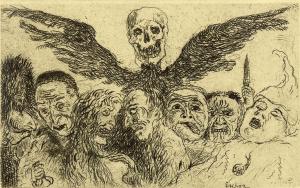
Sadly, many Christians like to cut themselves completely off from everyone and everything they believe to be impure, such as unbelievers, looking down upon them, because such Christians believe others have already been judged and condemned by God, and so should be condemned by them as well. They want to keep to themselves away from what they believe is the evil of the world, only to prove that they are the ones who have lost their way, and in doing so, embrace their own evil as they have become prideful, judging and condemning those they have no authority to judge or condemn. They should not look at others as being unworthy of them and their association, as a challenge for their way of life because such people are not Christian or their actions do not conform to Christian morality; rather, Christians should look towards everyone with the eyes of Christ, with the eyes of love that the incarnate God-man has for those who have stayed.
Christ is the Good Shepherd, and he purposefully came among wayward humanity, among those who were seen as furthest from the kingdom of God, because he knew they needed his love and attention. He knew that if they were shown it, they would more likely respond to it positively. Those who did not were those who were prideful, thinking Christ had nothing they needed, as they thought they were already pure and God already approved them of all they had done. In thinking this way, while they might cut themselves off from others, they certainly cut themselves off from Christ, and they will not be able to receive his offer of grace until they understand how far they are from the holiness they think they possess. When Christians forget this, they become one of the wayward sheep themselves, as they end up closing themselves from the way of love, and therefore, to Christ, who they claim to follow.
Christ came into the world to save everyone, to bring humanity together; he came to be the prince of peace, not to divide humanity further, but to find a way to break down the divisions which sin caused so that humanity can come together and be one as God always intended humanity to be:
When one sheep strayed from the heavenly way of life, evil drew our nature to an arid, uncultivated place; no longer does this number [one] pertain to the sheep which have not strayed but to the ninety-nine sheep. Vanity does not belong to the number of those who are included which is why “deficiency cannot be numbered.” Therefore Christ comes to seek and save the last sheep. He places it upon his shoulders, thereby restoring [apokatastesai] [the sheep] lost in the vanity of insubstantial things in order to make whole the number of God’s creation by saving the lost along with those who have not been destroyed. [1]
Yes, we can read about Christ speaking in ways which, at first glance, seem to contradict this, as when he said we should tot think he came to bring peace, but a sword, but those texts must be understood as to what the sword entails: Christ does not come to affirm things as they are, as if they do not need reform, so as to bring a false peace where everyone conforms to the structures of sin, but rather, Christ came to cut away and destroy the structures of sin, for then, when they are destroyed, can humanity come together and his role as the prince of peace can truly be revealed.
God is always working to bring about the greatest good, restoring everything to the state it was before sin hurt it. God draws out sin from, and the world around us, like the way a doctor would draw out the venom of a snake bite. Those who have been poisoned by sin need Christ’ healing grace, grace not only serves as an antidote to the poison, but grace which can help restore and make better that which sin had corrupted or destroyed. It is for this reason that many, like St. Gregory of Nyssa, suggest that death has its place in the divine economy because it can be used to eliminate the power and damage of sin:
Since, then, our nature was created from the beginning by the God of all things as a second vessel capable of receiving what is good, but the enemy of our souls has deceitfully poured evil into us, so that the good has no more room, for this reason – so that the evil instilled into us might not remain forever – the vessel is shattered by death for a time by a beneficent providence, so that the evil might flow away and what is human might be shaped anew and restored, unmingled with evil, to the life it had in the beginning. For this is the resurrection: the formation of our nature once again in its original condition.[2]
We are temporal creatures who always were going to have our temporal existence come to an end; without sin, we would have found ourselves eventually assumed into heaven, either when we discerned it was time to move on, so to speak, to a new mode of being, or when God revealed to us it was our time. Mary, the Mother of God, shows to us, through her death and assumption, what was intended for all of us: that is, we would all die, we would all come to an end to our temporal existence. However, our death would not be a death contaminated by sin, and so it would have led directly to our own glorification (like it did for the Theotokos). Sin changed that. It has us live our life with a “spiritual death,” so that now, the end of our lives does not lead directly to our glorification, but rather, it continues the onslaught of sin upon us, breaking us down even further, cutting asunder our holistic integrity, as our body and soul are disconnected from each other. Nonetheless, God has found a way to use death for our own good, as God uses it as a means to limit the potential for sin, to make sure it does not continue on toward infinity, as it would if we were simply immortal. And then, God has done something even greater, for in and through the incarnation, Christ transformed death once again by the way he embraced death. Now, the spiritual death we all face due to sin is overcome by his death, so that those who die can now find Christ is with them in their death, that even in the realm of the dead, God is there showing them love and compassion; they can now open themselves up to Christ, join themselves to him, and find themselves sharing with him his resurrection from the dead.
Because of the way sin has corrupted the end of our temporal existence, death can be described as an evil, but because that evil, like all evil, uses and corrupts a good which existed before it, the good that remained was able to be taken up by Christ and used as the foundation by which he would restore all the good which God intended us to have as we go from temporal to eternal life. That is Jesus, is able to use even the “evil of death” for God’s greater good, giving us a way to even describe death as being “a good.” For God is always capable of taking the evil which we have produced, and redirect it for some greater, new good which we could not have foreseen, a good which is not only founded upon the good which evil corrupted, but which is able to be made better than it was before due to grace. God has given us freedom, but God knows how to embrace the product of our freedom, to redirect it to God’s intended end, the end of which, as Gregory of Nyssa explained, is for having all those “lost” restored by Christ, for only in this way can the evil of sin be truly conquered.
[1] St. Gregory of Nyssa, Homilies on Ecclesiastes. Trans. Richard McCambly. Ed. John Litteral (Ashland, KY: Litteral’s Christian Library Publications, 2014), 31. [Homily 2].
[2] St. Gregory of Nyssa, “A Discourse of Consolation for Pulcheria” in On Death and Eternal Life. Trans. Brian E. Daley (Yonkers, NY: St. Vladimir’s Seminary Press, 2022), 135.
Stay in touch! Like A Little Bit of Nothing on Facebook.
If you liked what you read, please consider sharing it with your friends and family!
N.B.: While I read comments to moderate them, I rarely respond to them. If I don’t respond to your comment directly, don’t assume I am unthankful for it. I appreciate it. But I want readers to feel free to ask questions, and hopefully, dialogue with each other. I have shared what I wanted to say, though some responses will get a brief reply by me, or, if I find it interesting and something I can engage fully, as the foundation for another post. I have had many posts inspired or improved upon thanks to my readers.













